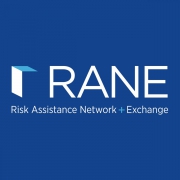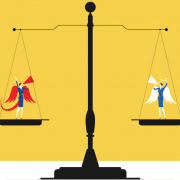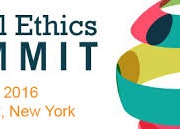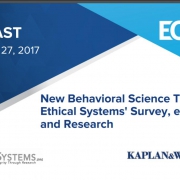Featured Business Ethics and Compliance Expert: Azish Filabi
 Interview with Azish Filabi, CEO of Ethical Systems
Interview with Azish Filabi, CEO of Ethical Systems
As the CEO of Ethical Systems, what keeps you motivated? Are you optimistic about the current state of business?
I am motivated every day by the opportunity to connect businesses with research and strategies that will make them more ethical and productive for the long term. We at Ethical Systems believe that good ethics is good business and our mission is to strengthen ethics within organizations by providing content, resources and tools by which to improve internal cultures and climates. It is rewarding to know that our organization is playing a needed role, and connecting with like-minded professionals.
Has the approach to corporate ethics by regulators changed in the last 5 years? Do you find their strategies have improved?
Regulators have recently brought much needed emphasis on how companies should think about the role of culture as part of their overall compliance strategy. As any good compliance officers knows, it’s very challenging to run an effective compliance program in the absence of a commitment to an ethical corporate culture. The regulatory emphasis on culture, both in the U.S. and the U.K., particularly in the financial services sector, has brought this discussion top of mind.
Key to overcoming the regulatory challenge is the difficulty of defining an ethical organizational culture and ways to measure such a culture.
In a forthcoming paper in the journal Behavioral Policy titled Regulating for Ethical Culture, Linda Trevino, Jon Haidt and I summarize the existing research on how to measure for ethical culture in organizations, and also provide some advice for how to regulate for culture – the punch line: there needs to be systems that allow for experimentation and data collection so that companies can better understand how their employees perceive their culture and how they can better prioritize their messages and approaches. You can’t know whether you have an internal culture that supports behavior unless you measure it – and you can only measure it by consistently asking employees (either through focus groups or surveys) about their perceptions.
To address this challenge, we at Ethical Systems have convened a working group of the top researchers in the U.S. on organizational culture to develop tools for measuring an ethical culture in organizations. You can see our initial findings on the website, and we will update the site when the final framework is developed. If you’d like to arrange for your company to run an ethical culture survey, please email me.
How can E&C teams better emphasize ethics vs. compliance?
Developing strategies to create an ethical culture is vital for the effectiveness of any compliance program. Compliance often refers to the specific actions taken to adhere to rules, regulations and policies. It is a very important, yet sometimes limiting exercise – what I mean is that monitoring the behavior of employees and creating enforcement-based sanctions regimes may not always be an effective way to motivate ethical behavior.
And there is social science research that shows that greater emphasis on compliance could lead to ethical fading.
To balance this approach, it’s important to tap into people’s intrinsic motivation to be more ethical. This is important- people want to do the right thing, most of the time.
You can do so by tying individual employee’s work to the purpose of the organization, by working with supervisors to create a fair work environment, and promoting internal communications that emphasize the good ethics and values of your employees (rather than messages that highlight ethics violations).
You should also consider some of the lessons of “behavioral compliance” – Jeff Kaplan and I discuss some in Head to Head: A conversation on behavioral science and ethics, an eBook available on the Ethical Systems website. We created this eBook to provide an easy to use resource for compliance practitioners who manage day-to-day program elements.
What are the newest resources from Ethical Systems for individuals and organizations?
If you haven’t already done so, you should check out our Behavioral Science One Sheets. These are intended for you to read and share with colleagues, either as part of an internal communications program or on a one-off basis. I can see, for example, that it could be an agenda item among E&C officers in your company to discuss how these topics could apply to your program.
I already mentioned our new Head to Head eBook above, and we are actively working on part 2. The other resource we recommend is a white paper that was published by Mind Gym, Inc., for which Jon Haidt and I write a foreward, that succinctly summarizes many of the social science research studies that companies should study when designing ethics programs.
If you could give one piece of ethics advice to companies, what would it be?
Focus on procedural fairness in your organization. It can bring value in various ways – it helps motivate your employees to be more engaged in their work and to care about the long-term value of the company. Research also shows that employees equate organizational fairness with ethics – in other words, they perceive a fair culture to be an ethical culture. This can help them (and your company) stay out of trouble.
If you could give one piece of ethics advice to individuals, what would it be?
Associate yourself with people whose ethics and values you admire or aspire to – you’ll not only learn from them but they will also inspire you to live within your own values.
What trends should companies be looking at that will impact corporate culture over the next 5 years?
One trend that we have observed recently is an increasing request for resources by business leaders who seek to create a more inclusive workplace culture in their companies. In addition to inclusion with respect to demographic diversity (such as gender and race) they seek strategies to solicit all voices at the table, across various topics. It’s not surprising that companies want to ensure that they can draw upon a diversity of viewpoints to improve performance and problem solving capabilities. But the challenge is creating a speak-up culture that is respectful of a diversity of viewpoints not only across business processes, but also socio-political issues and workplace policies.
We know from research that fairness plays a big role in inclusiveness (and also ethics, as I mention above—not surprisingly, these concepts overlap). Organizations that employees perceive to be more fair – e.g., allocate resources fairly, make fair decisions and treat employees fairly – are also better at motivating and engaging employees. Employees at these organizations also perceive less misconduct in the workplace.
So, when it comes to creating an inclusive culture, we think you should start with organizational justice and fairness. Procedural fairness creates processes where all voices can be heard and considered, and the company will have more satisfied and engaged employees as a result. But there’s so much more to uncover about this very complex topic, which is the focus of a new project we will soon launch. We are creating a Speak-up Culture Assessment tool and accompanying research to help companies in this important area.
Additional Questions:
- Featured academic article
See a list of Azish’s recent publications
Head to Head: A conversation on behavioral science and ethics
- Featured popular article
“Are We in a Compliance Arms Race?” NYU Law’s Compliance and Enforcement Blog








